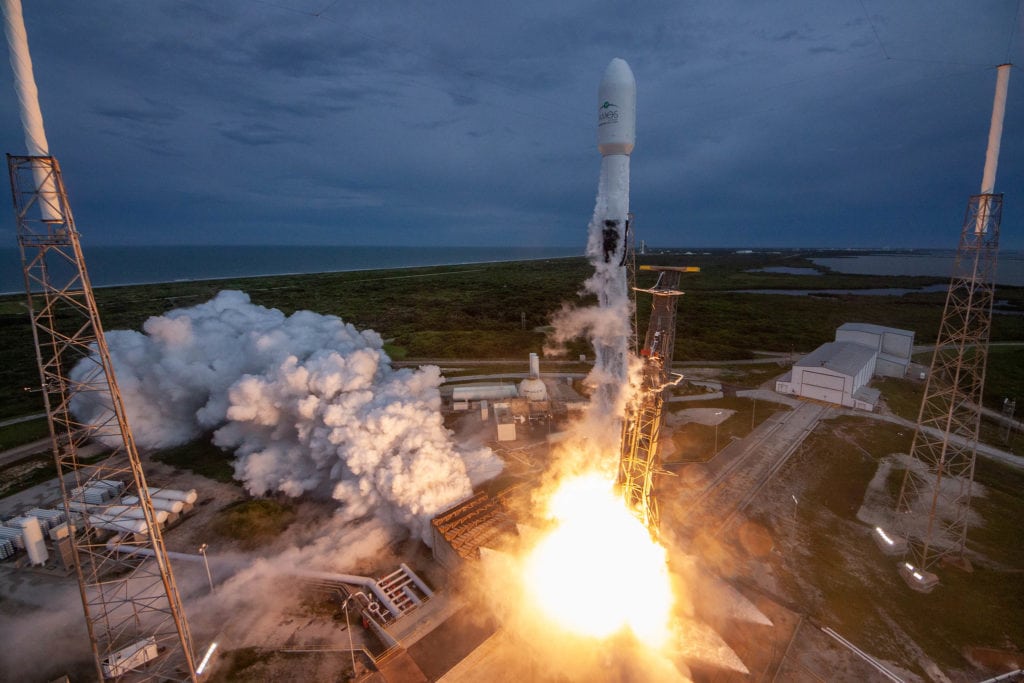|
Making the internet go like a rocket
|
We were delighted by the positive response to our first Curiously Green newsletter a few weeks ago, as well as an incredible response to Website Carbon v2.
This month’s issue looks to the stars to see if space internet could be a sustainable option, and keeps our feet on the ground with a look at sustainable hardware and a book review about rewilding nature from my colleague Jerome.
As always, please do send us your ideas and feedback for future editions by replying to this email or tweeting us @eatwholegrain.
– Tom Greenwood
|
|
|
Top picks from the green web
|

12,000 satellites aren't enough for space broadband
|
There are few things that I have found more exciting in the past few years than SpaceX managing to land rockets back on earth. It’s truly mind blowing engineering and from an environmental perspective, re-usable rockets are of course less wasteful.
That said, Elon Musk has been quite clear about the fact that you can’t break out of earth’s gravity without burning fuel – electric spaceships are not on the horizon. So I was intrigued to see that SpaceX is rapidly deploying its global satellite broadband system with an additional 30,000 satellites that will be launched into space through 24 rocket launches over the next year. I’m excited by greater access to information worldwide and by potentially huge increases in web speeds, but I have to wonder – is space broadband a sustainable technology?
According to figures from Smithsonian Magazine, each Falcon Heavy rocket launch burns 440 tonnes of RP-1 fuel with 34% carbon. Some quick maths shows that when combined with oxygen into CO2, that’s 549 tonnes per launch, or 13,176 tonnes of CO2 for the 24 launches. To give perspective, that’s equivalent to 2500 economy return flights from London to Sydney. That’s a lot of CO2, but not as much as I expected. After all, a long haul flight carries about 500 passengers, so its similar to just 5 planes flying London to Sydney. As a guess, I’d say it is likely a lot less than building physical infrastructure for a worldwide cable broadband or 5G network.
Then we need to think about operation of this network. I am assuming that the satellites themselves are solar powered (fingers crossed). So the main energy input would be in beaming all of our data from earth into space. Knowing that wireless data transfer is far more energy intensive than cable, I’m guessing that it could be a lot more energy intensive to operate than our current earthly networks. If you have any information on this, please do let me know.
Finally, I wonder if there are any human health implications of dousing the entire earth in high speed WiFi. I guess we’ll probably need to wait about another 50 years to know the answer to that.
|
|

Using photonics to develop low emission internet
|
Back down on earth, new technology may allow much faster internet speeds with less energy. A European consortium with the name TERIPHIC (cringe) are developing optical data transceivers capable of transmitting 1.6 Terrabytes per second with half the power consumption of current technology. As our hunger for data increases, its positive to see effort going into solutions that can meet this demand while also helping tackle the issue of internet energy use. We just need to ensure that we don’t waste such progress by becoming more wasteful in our use of data.
|
|

What computers and smartphones are best for the environment?
|
This month’s issue of Ethical Consumer magazine goes into depth on the environmental and social performance of our daily tech, including desktops, laptops, 2-in-1 tablet/laptops and smartphones.
As someone who currently uses an HP laptop and a Samsung phone, I was disappointed to find HP listed as a Brand to Avoid and Samsung getting the lowest overall score. For the computer categories, there were no Best Buys listed because apparently they could not find a brand setting a great example in these categories. The most positive example was an interesting eco-brand from Ireland called Iameco. In the smartphone category, the only Best Buy was Fairphone, who have just released Fairphone 3, which the Guardian rate as better than the last one – high praise indeed 😉
The best option? Buy second hand or refurbished.
|
|

The performance cost of custom web fonts, and how to solve it
|
I love great typography and feel that custom typefaces have made the web a more beautiful and enjoyable place in recent years. The problem is that although technology has enabled greater creativity, it has come with a significant penalty in terms of both web performance and sustainability.
Fear not, there are solutions! I really love this article by our lead developer Josh, who shows that if we just apply some attention to detail, we can use beautiful typefaces with negligible impact on performance or the planet.
The highlight that stuck in my head is that the size of a single font file can potentially be reduced by over 97%!
|
|
|
|
|
In the field of technology, simplification is always an enormous advance
|
Pierre Boulle, Garden on the Moon
|
|

Wilding by Isabella Tree
|
‘Wilding’ tells the story of an ambitious attempt to return an intensely farmed Sussex estate to natural processes. Although the land was unremarkable and the landowners inexperienced in conservation, extremely rare species like the turtle dove appeared on the land very soon and now breed at Knepp in unparalleled numbers. The secret of their success, as Isabella Tree explains, was a radical notion that instead of a highly managed and target driven approach to conservation, nature could be trusted to emerge in its own way given the right environment.
The result is a book that beautifully describes what happens when we check our desire to control and command the world around us and instead provide just what is needed in a situation and nothing more.
– Jerome Toole
|
|
|
|
|
Quick links from our team & friends
|
|
|
|